Central America
EU sanctions Nicaraguan leader’s wife, son over repression

AFP
The EU imposed sanctions Monday on Nicaraguan President Daniel Ortega’s wife Rosario Murillo, who is his vice president, as well as one of his sons and six more officials.
The measures expand a previous sanctions list to now count a total of 14 individuals held “responsible for serious human rights violations in Nicaragua and/or whose actions undermined democracy or the rule of law” over ongoing repression in the Central American country.
“The detention of a seventh potential presidential candidate… sadly illustrates the magnitude of the repression in Nicaragua and projects a grim picture for the upcoming elections,” the European Council said.
The sanctions prohibit travel and transit in the EU for those targeted, a freeze on any EU-based assets and a ban on EU businesses or citizens from doing business with them.
Ortega, 75, is expected to run for re-election in November 7 polls.
After a first stint as president between 1984 and 1990, he returned to power in 2007 and has stayed in office ever since. He made his wife his vice president in 2017.
In 2018, demonstrations against their rule were brutally put down by government forces, leaving more than 300 dead and pushing thousands into exile according to rights bodies.
In a clampdown that began on June 2, Ortega’s government has rounded up political rivals in a series of house raids and night-time arrests on charges of threatening Nicaragua’s sovereignty.
Ortega has called them seditious “criminals” and “agents of the Yankee empire”.
Seven opposition presidential hopefuls are among 31 people detained. The latest was Noel Vidaurre, seized on July 24 and put under house arrest.
Despite pressure from the European Parliament, EU member states did not add Ortega himself to the growing sanctions list.
“These measures are targeted at individuals and are designed in this way not to harm the Nicaraguan population or the Nicaraguan economy,” the EU statement said.
It added that it “firmly condemned the repression of political opponents, demonstrators, independent media and civil society” continuing in Nicaragua.
In June, the United States announced sanctions against four Nicaraguan officials allied to Ortega, including his daughter.
The EU and US are calling on Ortega to immediately release those arrested and for his government to hold dialogue with the opposition.
Central America
Nicaragua’s Ortega and Murillo Mourn Pope Francis, Acknowledge ‘Difficult’ Relationship

Nicaraguan President Daniel Ortega and Vice President Rosario Murillo, who also serve as co-leaders of the country, expressed their condolences on Monday following the death of Pope Francis, acknowledging that their relationship with the late pontiff had been “difficult” and “troubled.” Nicaragua officially suspended diplomatic ties with the Vatican during his papacy.
“Our relationship, as Nicaraguans who are believers, devoted and faithful to the doctrine of Christ Jesus, was difficult and troubled—unfortunately shaped by adverse and painful circumstances that were not always understood,” Ortega and Murillo wrote in a message of condolence.
“Despite the complexity and hardships, despite the manipulation we all know occurred, despite everything, we kept our hope alive through Christian faith,” they continued. “We understood the distance, and above all, the complicated and strained communication that prevented better relations. We also recognized the confusion caused by strident voices that disrupted any attempt at genuine interaction.”
Pope Francis had previously compared the Ortega regime to communist dictatorships and even to Hitler, a remark that further strained relations between Managua and the Holy See.
Central America
Cardinal Rodríguez to Attend Funeral of Pope Francis: “He Was Very Dear to Me”

Honduran Cardinal Óscar Andrés Rodríguez announced on Monday that he will attend the funeral services of Pope Francis, who passed away at the age of 88 at his residence in Casa Santa Marta due to a stroke.
“We will be there throughout the novena and then, God willing, at the burial,” Rodríguez said in a phone interview with HRN Radio in Tegucigalpa, apparently calling from Spain.
He added that the last time he saw Pope Francis was in October 2024, during and at the end of that year’s synod, and that they remained in contact through email. “Sometimes, the Pope would even call me,” said Rodríguez, who was born on December 29, 1942, and was made a cardinal by Pope John Paul II on February 21, 2001.
Rodríguez expressed deep sorrow over the passing of Pope Francis, saying: “He was a very dear person to me.”
However, he also shared a message of hope, pointing out that the Holy Father passed away during Easter: “This is a sign. He gave his life completely like the Lord Jesus, and though he died, we believe in faith that he has risen, now with Christ in eternal life.”
Rodríguez, who for ten years coordinated the Vatican’s Council of Cardinals, was one of the eight cardinals selected by Pope Francis to help govern the Catholic Church and reform the Roman Curia.
In January 2023, upon turning 80, Rodríguez stepped down as Archbishop of Tegucigalpa, and Pope Francis appointed Spanish priest José Vicente Nácher Tatay as his successor.
Central America
Senator Van Hollen Meets with Deported MS-13 Member in El Salvador; Trump and Bukele React

U.S. Democratic Senator Chris Van Hollen, representing the state of Maryland, held a meeting in El Salvador with deported MS-13 gang member Kilmar Ábrego García, a member of the criminal group classified by the U.S. government as a terrorist organization.
“Kilmar Ábrego García, miraculously resurrected from the ‘extermination camps’ and ‘torture chambers,’ now sipping margaritas with Senator Van Hollen in the tropical paradise of El Salvador!” wrote President Nayib Bukeleon X (formerly Twitter), sharing photos of Van Hollen, Ábrego García, and a lawyer sitting together at a Salvadoran hotel.
The deported gang member is seen wearing a plaid shirt and a flat-brimmed cap, seated at a table with glasses and coffee cups. The senator also shared images of the meeting on his own social media accounts.
Bukele reaffirmed that Ábrego will remain in El Salvador and will not be returned to the United States.
“Now that his health has been confirmed, he has earned the honor of remaining under the custody of El Salvador,” Bukele added.
Former U.S. President Donald Trump criticized the senator’s meeting with Ábrego on Truth Social, calling Van Hollen “a fool” for advocating for Ábrego’s return to the U.S.
-

 International5 days ago
International5 days agoPope Francis and Trump, a relationship of disagreements marked by migration
-

 International4 days ago
International4 days agoEl Salvador formalizes the proposal for the exchange of Venezuelan deportees, according to Bukele
-

 International5 days ago
International5 days agoWithin Francis’ private wake: respect and prayer for the deceased pope
-

 International4 days ago
International4 days agoFrom the transfer of the coffin to the funeral, three days to say goodbye to Pope Francis
-

 International5 days ago
International5 days agoTrump’s emissary will visit Russia this week for consultations on the arrangement in Ukraine
-

 International5 days ago
International5 days agoCardinal Becciu’s enigma: will he enter the conclave?
-

 International4 days ago
International4 days agoA very heterogeneous and divided conclave will elect the new pope
-

 International4 days ago
International4 days agoModi returns to India and shortens his visit to Saudi Arabia after a deadly attack in Kashmir
-

 International5 days ago
International5 days agoThe pope last called the Gaza parish on Saturday and asked about the children
-

 International5 days ago
International5 days agoA candidate for the Supreme Court denounces an unequal dispute in the judicial election of Mexico
-

 International5 days ago
International5 days agoAmerican universities and colleges sign a letter against Trump’s policy
-

 International2 days ago
International2 days ago“A dignified life” for migrants, the plea in Panama in memory of Pope Francis
-

 International5 days ago
International5 days agoInternational leaders begin to confirm their presence at Pope Francis’ funeral
-

 International5 days ago
International5 days agoThe Government of Colombia presents twelve questions that it will propose in a popular consultation to promote its reforms
-

 International5 days ago
International5 days agoBurma’s military junta extends ceasefire until April 30 due to the earthquake
-

 International2 days ago
International2 days agoA Russian general dies in the explosion of a car bomb near Moscow
-

 International3 days ago
International3 days agoThe Pope’s funeral procession through the center of Rome worries the Italian authorities
-

 International3 days ago
International3 days agoThe Arab League supports Hamas handing over control of Gaza and weapons to the Palestinian Authority
-

 International4 days ago
International4 days agoThe Peruvian Public Ministry denounces the former attorney general for an alleged corruption case
-

 International4 days ago
International4 days agoMaradona’s house arrest is again a focus of tension in the trial for his death
-

 International4 days ago
International4 days agoA judge orders the Trump Government to restore Voice of America services
-

 International5 days ago
International5 days agoRoyal quinoa, the superfood that grows in front of the largest salt flat in the world in Bolivia
-

 International2 days ago
International2 days agoA magnitude 6 earthquake shakes the province of Esmeraldas in Ecuador, bordering Colombia
-

 International4 days ago
International4 days agoDonald Trump will visit Saudi Arabia, Qatar and the United Arab Emirates in mid-May
-

 International5 days ago
International5 days agoChurch charges ceased or resigned in the papacy of Francis for cases of pedophilia
-

 International3 days ago
International3 days agoMigrants want to stay on Mexico’s southern border because of Sheinbaum’s industrial plan
-

 International4 days ago
International4 days agoThe president of the World Bank underlines his intention to lift his veto on nuclear energy
-

 International3 days ago
International3 days agoA group of the poor and a delegation of migrants will participate in the funeral and burial of the pope on Saturday
-

 International4 days ago
International4 days agoMarco Rubio reorganizes the State Department to eliminate offices and jobs
-

 International2 days ago
International2 days agoPope Francis’ funeral procession will be a six-kilometer journey through the heart of Rome
-

 International3 days ago
International3 days agoThe pope’s doctor reveals his last moments of life and that he wanted to “die at home”
-

 International3 days ago
International3 days agoFrom email to marriage: the day Pope Francis married a Uruguayan couple
-

 International4 days ago
International4 days agoThe Brazilian Supreme Court opens trial against six others accused of leading the coup attempt
-

 International2 days ago
International2 days agoPutin and Witkoff address possible direct negotiations between Russia and Ukraine
-
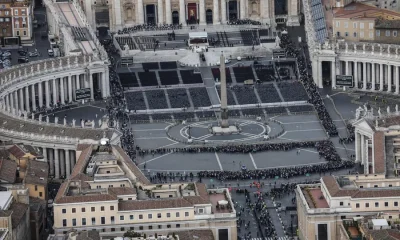
 International2 days ago
International2 days agoPreparations for Pope Francis’ funeral, in figures
-

 International4 days ago
International4 days agoA judge in the United States stops the deportation to El Salvador of a hundred Venezuelans
-
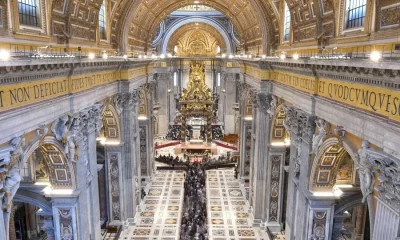
 International2 days ago
International2 days agoThe protocol for the funeral of Pope Francis, a delicate diplomatic work
-
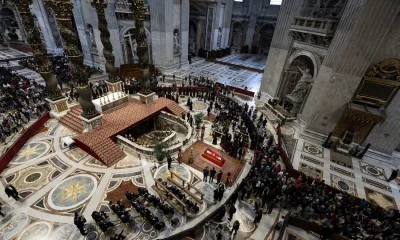
 International2 days ago
International2 days agoSocial networks, protagonists in the farewell to Pope Francis for ‘selfies’ in front of his coffin
-
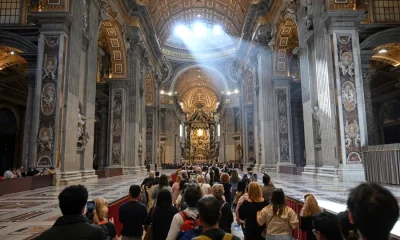
 International2 days ago
International2 days agoAbout 150,000 people say goodbye to the pope in St. Peter’s Basilica before the funeral
-
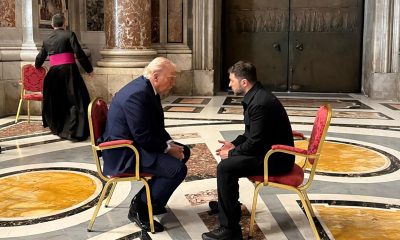
 International18 hours ago
International18 hours agoTrump and Zelensky hold “very productive” meeting in Rome during Pope’s funeral
















